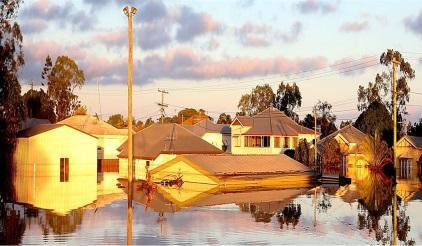
Hazards such as floods are a key test for the resilience of businesses and the communities of which they are part (Photo: Australian Business Roundtable)
By Jonathan Fowler
GENEVA, 13 July 2017 – Businesses of all sizes need to ensure that resilience lies at the core of their decision-making processes in order to help the authorities and the wider community reduce the risk of disasters.
The UN Office for Disaster Risk Reduction (UNISDR) works hand in hand with companies to ensure that curbing the threat posed by natural and human-induced hazards etched into business strategies.
“The private sector is taking an active role to reduce disaster risk across their value chain, whether it be across their organization assets, people, suppliers, customers or supply chain. It's good business and provides agility in being able to respond to rapidly changing market conditions,” said Mr. Oz Ozturk, a partner at PwC and co-chair of the UNISDR Private Sector Alliance for Disaster Resilient Societies, which is known for short as ARISE.
“We have found the organizations and economies that benefit most are the ones which have made these strategic and operational decisions hand in hand with governments and communities. This is because all parties bring insights and knowledge which helps protect the ecosystem and allows a more holistic approach in investing for disaster resilience.”
“Ultimately the investments across the value chain are relevant and sustainable.”
In March 2015, the international community adopted the Sendai Framework for Disaster Risk Reduction, a 15-year plan to make countries more resilient. It was the first building block of the wider 2030 Agenda for Sustainable Development.
The Sendai Framework puts the onus on governments to bring about change, but is relatively unusual in the world of international agreements in that it says that other players also have a specific role. The private sector is one of those singled out in the accord.
Given that sharp focus on the role of business, UNISDR and its partners created ARISE in November 2015, building on several years of work.
ARISE aims to leverage business resilience know-how and encourage investment decisions that take disaster risk into account, in order to help the private sector to play its role in implementing the Sendai Framework through to 2030.